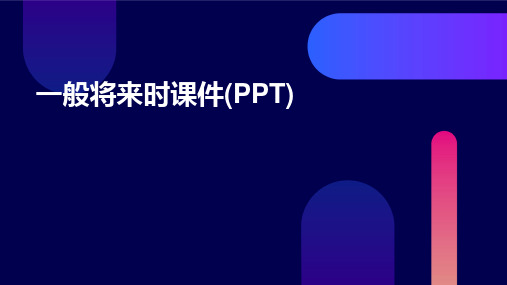最新一般将来时课件精选课件ppt
一般将来时(21张PPT)初中英语专项复习课件(2)

【典例1】My sister wants a new dress. She ____ it
to the party.
A. wears
B. is going to wear
C. wore
D. has worn
考查动词的时态。句意:我妹妹想要一条新裙子。她想 派对上穿。由My sister wants a new dress可知动作还未执 行,故用be going to形式,表示有计划做某事。
【典例2】He ________ her a beautiful hat on her next
birthday.
【典例3】 —Which team do you think ______ the game? —Hard to say. There are still ten minutes before it ends. A. won B. has won C. will win D. wins
考查动词的时态。句意:—你认为哪个队会赢这场 比赛?—不好说。还有十分钟才结束。根据句意判 断为一般将来时,选用will+动词原形。
volleyball match.
A. will watching B. watches
C. is watching
D. are going to watch
考查动词的时态。句意:后天,他们将看一场排球 赛。The day after tomorrow为一般将来时标志词, 选用将来时结构be going to do,故答案选D。
【典例2】There __________ a meeting tomorrow
初中一般将来时公开课课件ppt

单击此处添加大标题内容
doctor, actor, lawyer or a singer 医生,演员,律师,还是歌手?
why not president, be a dreamer 为什么不能是当总统呢,要成为一个梦想家
you can be just the one you wanna be 只要你想,你就能成为你想做的人
否定句:Bus will not run everywhere. 疑问句:Will bus run everywhere? People will have robot . 否定句:people won’t have robot. 疑问句: Will people have robot? People will have less teeth. 否定句: People won’t replace people 疑问句: Will robot replace people?
• will be; is
B. is; is
• C. will be ; will be D. is ; will be
3. Mother me a nice present on my next
birthday.
A. will gives B. will give C. gives D. give
Conclusion 总结
构成:1.肯定句:主语+will +动词原形+其他
时间标志词:
tomorrow
soon
from now on
In the future
next+
in +
2否定句:主语+won’t+动词原形+其他
一般将来时课件(PPT)

“be able to”表示将来有能力做某 事时,使用一般将来时形式,例如“I will be able to help you”。
情态动词如“can”、“may”、 “must”等,在一般将来时中通常直 接加动词原形,例如“I can swim”。
03
一般将来时在句子中的运用
陈述句中的使用
表示将要发生的动作或存在的状态
纠正方法
应使用正确的将来时形式,如 "He will go to the park tomorrow." 或 "He is going to the park tomorrow."
忽略动词变化规则
错误示例
They will play football in the future.(忽略了动词play在将来时中的变化)
纠正方法
在将来时中,应使用正确的助动词或情态动词形式,如 "I will be able to help you with your homework." 或 "I can help you with your homework."
错误示例
He will must finish his work before leaving.(错误地使 用了情态动词must)
作用
用于表示未来的计划、打算、预测、 假设等。
常见表达形式
will + 动词原形
表示将来的动作或状态,如“I will go to the park tomorrow.”(我明天将去公园。)
be going to + 动词原形
表示计划、打算或即将发生的动作,如“I am going to study hard this semester.”(我这 学期打算努力学习。)
一般将来时PPT课件

•一般将来时基本概念•一般将来时结构与用法•一般将来时时间状语及标志词•一般将来时与其他时态对比•一般将来时在各类从句中运用•一般将来时误区及注意事项•总结回顾与拓展延伸目录01一般将来时基本概念定义与特点定义特点表现形式will + 动词原形be going to + 动词原形现在进行时表示将来预测未来计划与安排条件与假设030201使用场景02一般将来时结构与用法主语+ be not going to + 动词原形+ 其他成分主语+ be to not (非标准用法,尽量避免使用) + 动词原形+ 其他成分主语+ will not (won't) + 动词原形+ 其他成分Will + 主语+ 动词原形+ 其他成分?Be + 主语+ going to + 动词原形+ 其他成分?Be + 主语+ to + 动词原形+其他成分?(较少使用,多用于书面语)特殊疑问词动词原形特殊疑问词going to +成分?特殊疑问词to +(较少使用,多用于书面语)注意:在一般将来时的使用中,要注意区分不同语境和表达方式的细微差别,选择合适的结构进行表达。
同时,也要注意与其他时态的区分和联系,避免混淆使用。
特殊疑问句结构03一般将来时时间状语及标志词常见时间状语表示将来的时间状语表示计划或安排的时间状语标志词识别与运用04一般将来时与其他时态对比与现在进行时对比时间指向不同01动词形式差异02使用情境不同03时间基准差异动词形式变化使用情境区别时间范围不同动词形式区别使用情境差异05一般将来时在各类从句中运用在宾语从句中运用01 02定语从句的时态取决于它所修饰的先行词,如果先行词是将来时态,定语从句也使用将来时态。
如果先行词是过去将来时,定语从句则使用过去将来时。
定语从句中表示将来的时间状语有:tomorrow, next year, in the future 等。
06一般将来时误区及注意事项误区二过度使用“will”和“going to”。
一般将来时课件ppt(共17张PPT)

Jim going to
afternoon?
in the playground tomorrow
4. .Jim is going to play football in the playground tomorrow afternoon.
Jim going to play football tomorrow afternoon?
2)在浊辅音和元音后读/d/.
一般过去时, 要用动词过去式. Jim is going to play football in the playground tomorrow afternoon.
Jim is going to play football in the playground tomorrow afternoon. ⑵are变为were。
there were many beautiful flowers there. 一般将来时表示将来某个时间要发生的动作或存在的状态常与表示将来的时间状语连用
⑴am ,is变为was。
So she They to read some books.
What did they do in the park? 1)在清辅音后读/t/ .
(3).动词过去式变化规则
a)一般情况下,直接加ed.如:wash--washed, look---looked; b)以不发音字母e结尾的,加d.如:like---
liked, dance---danced; c)以“辅音字母+y”结尾的,变y为i再加ed. 如:study---studied;
food and (play) lots of games. They
(come) home at 4:30.
一般将来时ppt课件

02 一般将来时的基本用法
表示将来要发生的行为
要点一
常见的助动词“will”和 “shall”可以用于表示将…
“I will go to the store tomorrow.”(我明天要去商店。 )
要点二
“be going to”也可以用于表达 将来要发生的行…
“It is going to rain later.”(待会儿要下雨了。)
肯定句
I am going to swim in the afternoon.
否定句
They are not going to watch the movie.
疑问句
Are you going to meet your friend tomorrow?
主语+be to+动词原形
肯定句
You are to hand in your homework tomorrow.
表示邀请或建议
总结词
表示邀请或建议某人做某事,通常用于 口语交流中。
VS
详细描述
在口语交流中,我们经常使用一般将来时 态来表示邀请或建议,例如:“Would you like to come to my house for dinner tomorrow?”(明天你想来我家 吃晚饭吗?)或者“Let's go for a walk after dinner.”(晚饭后我们去散步吧。 )
02
在一些情况下,我们也可以使用“be going to”来表达将来时
。例如
It is going to rain.(将要下雨了。)
03
构成
They are going to graduate next year.(他们将于明年毕业。)
一般将来时PPT课件

05
解析
含有will的句子改为否定句时 ,在will后加not,缩写为 won't。
06
THANKS
感谢观看
06
一般将来时练习题精选与解析
选择题精选与解析
01
题目:I _______ to the cinema. Will you go with me?
02
A. go B. am going C. have gone D. went
选择题精选与解析
答案:B
解析:由后一句“Will you go with me?”可知是打算去做某事,是一般将来时,所以用现 在进行时表将来,选B。
题目:— What _______ you _______ to do tomorrow?
选择题精选与解析
— I _______ visit my uncle. A. are; going; am going B. are; going; am going to
C. are; going to; am going D. are; going to; am going to
区别
现在进行时强调当前正在进行的动作 或状态,而一般将来时则强调未来将 要发生的动作或状态。
联系
两者都可用于表示将来的情况,但侧 重点不同。现在进行时通过现在正在 进行的动作暗示将来,而一般将来时 则直接表达将来的动作或状态。
与过去将来时的区别与联系
区别
过去将来时表示从过去某一时间 看将要发生的动作或状态,而一 般将来时则是从现在看将来要发 生的动作或状态。
表示将来经常发生的动作或习惯
常用的时间状语
always, often, usually等 。
句子结构
2024版一般将来时时态课件

2024/1/30
12
在疑问句中的位置和功能
位置
在疑问句中,一般将来时通常将助动词“will”或“be”提至主语之前,构成 疑问语序,表示询问将来的动作或状态。
功能
疑问句中的一般将来时用于询问未来将要发生的动作或存在的状态,具有询问 和获取信息的功能。
2024/1/30
13
在感叹句和祈使句中的应用
01
02
03
04
疑问词 + will + 主语 + 动词 原形 + 其他成分?
例如:What will you do tomorrow? 你明天要做什么?
疑问词 + be going to + 动词 原形 + 其他成分?
例如:Where are you going to meet? 你们打算在哪儿见面?
2024/1/30
用法
表示将要发生的动作或存 在的状态,以及计划、打 算或准备要做的事。
例子
I will go to the park tomorrow.(我明天将去 公园。)
8
be going to+动词Байду номын сангаас形
构成
be going to+动词原形,其中be 动词随主语的人称和数的变化而 变化。
2024/1/30
16
缩写规则及注意事项
“will not”可以缩写为“won't”,但需要注意在正 式场合或书面语中,通常使用完整形式“will not”。
输标02入题
在缩写“won't”中,撇号(')代表省略的字母“o”, 而不是表示所有格或缩写。
01
03
- 1、下载文档前请自行甄别文档内容的完整性,平台不提供额外的编辑、内容补充、找答案等附加服务。
- 2、"仅部分预览"的文档,不可在线预览部分如存在完整性等问题,可反馈申请退款(可完整预览的文档不适用该条件!)。
- 3、如文档侵犯您的权益,请联系客服反馈,我们会尽快为您处理(人工客服工作时间:9:00-18:30)。
• 5.be +v-ing go, come, leave, start, arrive, stay, fly, land, take off等动词可用现在进行时表示安排
和计划或即将发生的动作。
• 我们明天动身去青岛.
• We’re leaving for Qingdao.
6.表示与生日,日历,课时安排或交通时刻表有关的 动作(一种规律) ,用一般现在时表示将来时态
一般将来时课件精选
• 1.结构: will/shall+ V原(shall仅第一人称)
• 肯定句:主语+ will +do+其他 • People will have robots in their homes. • 否定句:主语+ will not /won't+do+其他 • People will not/won’t have robots in their homes. • 一般疑问句:Will+主语+do+其他? • 肯定回答:Yes, 主 will • 否定回答:No, 主won’t. • 特殊疑问:疑问词+will +主+V原+····?
• 常用于转移动词如:
• begin, come , leave, go, arrive, start, stop, return, open, close…
• The evening class begins at 19:00.
• 火车两点出发.
• The train starts at two.
C. is to
D. should
was /were about to do … when… 正要…突然发生… • 英语晚会即将开始。
• The English Evening Party is about to begin.
• 我正要出去,这时下起了雨.
• I was about to go out when it began to rain.
看那些乌云要下雨了. Loot at the dark clouds. It _is__g_o_in__g_t_o_rain.
• 3.be to do
①表按计划或安排即将发生的动作 ②表示约定,责任,命令,或注定要发生的动作。 ③官方计划或决定(常见于报纸或广播)
He and I are to meet at the railway station
tomorrow. 计划,安排
You are not to be back late. 责任,命令 If not watered, the plants are to die.
注定要发生的动作
The president is to speak on TV tonight.
官方计划或决定
4.be about to do 表示正要做…,马上要做... (不能与表示将来的时间的状语连用)
2. —What are you going to do this afternoon?
—I am going to the cinema with some friends. The film _____quite early, so we ____ to the bookstore after that.
--- My car won’t start. ---Don’t worry, I will come and give it a push.
2、be going to
①表示计划,安排要做的事 ②表示现在的迹象推断未来可能发生某事。
--- What _a_re__y_o_u__g_o_in_g__t_o__do this evening? --- I am going to do my lessons.
• 1.will与shall+v • 1)表示一个将来的动作或状态,“要…,会…” • She will go to the park tomorrow. • 2)表示不以人的意志为转移的自然发展的事。 • Tom will be 18 next year. • Spring will come again. • Tomorrow will be Sunday. • 3) will+v 有时表示说话是临时决定或打算。
注:在时间或条件状语从句中,从句用一般现 在时表示将来时:when, as soon as, before, once, if , unless, even if, in case
If you come this morning, we will have a meeting.
When I graduate, I will go to the countryside
A. finished; are going B. finished; go C. finishes; are going D. finishes; go
3. My younger brother ____be 15
years old next year.
A. is going to B. will
祈使句+ and/or+将来时(will)
• 努力工作否则你就会失败。 • Work hard or you will fail. • 努力工作你就会成功。 • Work hard and you will succeed.
The Future Simple Tense
1.will+动词原形 (I /we shall) 2.be going to+动词原形 3.be+to do 表示计划,责任,约定或命令 4. be about to do sth 表示正要做…,马上要做... (不能与表示将来时间的状语连用) 5.be+v-ing 6.一般现在时表将来
ou do if it _______
2. tomorrow ?
—We have to carry it on, since
we’ve got everything ready.
A. rain
B. rains
C. will rain D. is raining
